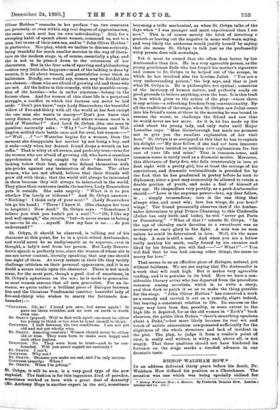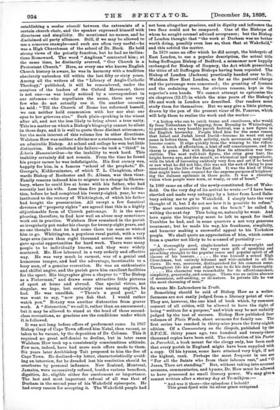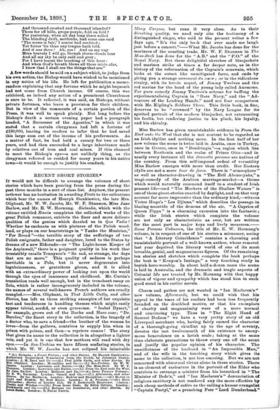BISHOP WALSHAM HOW.* IN an address delivered thirty years before
his death, Dr.. Walsham How defined his position as a Churchman. The occasion was one which was being specially utilised for
• Bishop Welchem flow;a Memoir. By Frederick Douglas How. London r lebister sad Ca 116i establishing a modus vivencli between the extremists of a certain church choir, and the speaker expressed himself with directness and simplicity. He mentioned no names, and he disclaimed all party alliances. Still, if we may be allowed to use a concrete example—and such are often very useful—he was a High Churchman of the school of Dr. Hook. He held strong views of the priestly function, but he had no inclina- tions Romeward. The word " Anglican " contented him ; at the same time, he distinctly averred, "Our Church is a Protestant Church." Here, as every one who knows English Church history is aware, be was in harmony with a tradition absolutely unbroken till within the last fifty or sixty years. Among all the writers of the "Library of Anglo-Catholic Theology," published, it will be remembered, under the auspices of the leaders of the Oxford Movement, there is not one—as was lately noticed by a correspondent in our columns—who repudiates the name, there are very few who do not actually use it. On another occasion he said : "Till the Church of Rome has reformed herself, we can neither hold communion with her nor shut our eyes to her grievous sins." Such plain-speaking is the wisest after all, and not the less likely to bring about a true unity. This is a matter on which a Bishop's biography cannot be silent in these days, and it is well to quote these distinct utterances; but the main interest of this volume lies in other directions. Walsbam How was neither a divine nor a statesman, but he was an admirable Bishop. At school and college he won but little distinction. He attributed his failure—he took a "third" in Literis Humaniaribus—to the inability to work hard. This inability certainly did not remain. From the time he found his proper career he was indefatigable. His first curacy was, happily for him, in a famous "school of the prophets," St. George's, Kidderminster, of which T. L. Claughton, after- wards Bishop of Rochester and St. Albans, was then vicar. Family reasons induced him to migrate to a charge in Shrews- bury, where he could live at home with his father, who had recently lost his wife. Leas than five years after his ordina- tion, before he had completed his twenty-eighth year, he was instituted to the rectory of Whittington, of which his father had bought the presentation. All except a few fanatical devotees of "property rights" are agreed that this is a highly objectionable form of Church patronage. It is the more pleasing, therefore, to find how well an abuse may sometimes work out in practice. Walsham How remained in the parish so irregularly put under his charge for twenty-eight years, and no one thought that he had come there too soon or wished him to go. Whittington, a populous rural parish, with a very large area (more than eight thousand acres) was one which gave special opportunities for hard work. There were many people to be individually known, and they were widely scattered. Mr. How labonred in a very orderly and effective way. He was very much in earnest, was of a genial and humorous temper, and had the advantage, inestimable to a busy man, of a genuine recreation. He was an enthusiastic and skilful angler, and the parish gave him excellent facilities for the sport. His biographer gives a chapter to "The Bishop as a Fisherman," and draws some attractive little pictures of sport at home and abroad. One special virtue, not singular, we hope, but certainly rare among anglers, he had. He was unselfish. "There's a good pool," he was wont to say, "now you fish that. I would rather watch you." Botany was another distraction from graver work. A "distraction," we call it, rather than an amusement ; but it may be allowed to stand at the head of these second- class recreations, so gracious are the conditions under which it is followed.
It was not long before offers of preferment came. In 1867 Bishop Gray of Cape Town offered him Natal, then vacant, or taken to be vacant, by the deposition of Dr Colenso. This it required no great self-denial to decline, but in later cases Walsham How took up a consistently conscientious attitude. Few men, indeed, have had more such offers made to them. Six years later Archbishop Tait proposed to him the See of Cape Town. He declined—by letter, characteristically avoid- ing an interview, for he dreaded lest his resolution should be overborne by personal influence. New Zealand, Montreal, Jamaica, were successively refused, besides various benefices, dignities, &c., eligible either for emolument or importance. The last and most important refusal of all was that of Durham in the second year of his Wakefield episcopate. He had every reason for accepting it. The Wakefield people had not been altogether gracious, and in dignity and influence the two Sees could not be compared. One of the Bishops of whom he sought counsel advised acceptance; but the Bishop of London thought that "the work at Durham was no better worth doing, possibly even less so, than that at Wakefield," and this settled the matter.
In 1879 came an offer which he did accept, the bishopric of East London, to use a popular description, the actual title being Suffragan Bishop of Bedford, a misnomer now happily exchanged for Bishop of Stepney, the Act which prescribed the titles of all Suffragan Bishops having been repealed. The Bishop of London (Jackson) practically handed over to Dr.
Walsham How East London, so far as the pastoral charge and the patronage were concerned ; the granting of licenses and the ordaining were, for obvious reasons, kept in the superior's own hands. We cannot attempt to epitomise the six chapters (12-17) in which the nine years of the Bishop's life and work in London are described. Our readers must study them for themselves. Bat we may give a little picture, drawn by the pen of the present vicar of St. Pancras, which will help them to realise the work and the worker :—
" A bishop who ran to catch trams and omnibuses, who would fly from Tottenham to Wapping, from Bromley to Whitechapel, to preside at a very humble parish festival, was a new figure in the English hierarchy. People liked him for the same reason that Israel and Judah loved David—because he went out and came in before them. Such activity, such movement, may easily become comic. It slips quickly from the winning to the ridicu- lous. A touch of affectation, a hint of self consciousness, and its charm is gone. But with Bishop How its attraction was irre- sistible. The neat well-knit figure, the crisp grey hair, the bright brown eye, and the mouth, so whimsical and sympathetic, with its trick of becoming suddenly very firm and set if he heard or saw what he did not like, this was not the sort of thing to pass unnoticed in the life of the East End. It was the kind of thing that might have been created for the express purpose of brighten- ing the dulness epidemic in those parts. It was a cheering vision when people were worn, or weary, or out of heart."
In 1888 came an offer of the newly-constituted See of Wake- field. On the very day of its arrival he wrote :—"I have been startled and made very unhappy by a letter from Lord Salis- bury asking me to go to Wakefield. I simply hate the very thought of it, but I do not see how it is possible to refuse."
"The most unattractive post on the bench" he called it, writing the next day This being so, naturally he went. And
here again the biography must be left to speak for itself.
Troubles he had, and in some quarters a not very generous treatment; but he made his way, his frankness, simplicity,
and humour making a successful appeal to his Yorkshire people. We shall quote an appreciation of him, which comes from a quarter not likely to be accused of partiality :— " A thoroughly good, single-hearted man—downright and upright—who possessed the very rare gift of speaking and preaching straight to the popular sense and popular spirit of an
classes of his hearers He was himself a sound High Churchman, but entirely tolerant and wide-minded in all his views. He was, moreover, distinguished for his common sense. Throughout life his great object was to do his duty thoroughly.
His character was remarkable for its affectionateness, simplicity, generosity, and courage. There was an entire absence of meanness, self-seeking, or ill-nature. In private life he was the most charming of men."
So wrote Mr. Labouchere in Truth.
Something should be said of Bishop How as a writer.
Sermons are not easily judged from a literary point of view.
They are, however, the one kind of book which, by common consent of all critics, will be allowed to have the right of being "written for a purpose," and which may be not unfairly
judged by the test of BUCCOSB. Bishop How published four volumes of Plain Wards, short sermons for family use. The
first series has reached in thirty-nine years the forty-eighth edition. Of a Commentary on the Gospels, published by the S.P.C.K. thirty years ago, two hundred and twenty-three thousand copies have been sold. The circulation of his Pastor in Parochid, a book meant for the clergy only, has been such that every parish in England might have been supplied with a copy. Of his hymns, some have attained very high, if not
the highest, rank. Perhaps the most frequent in use are "For all the Saints who from their labours rest," and "0 Jesus, Thou art standing." But, without taking into account sermons, commentaries, and hymns, Dr. How must be allowed to have possessed no small literary power. We may give a sonnet written after a stormy day at Trondhjem :— "And was it there—the splendour I behold ?
This great fjord with its silver grace outspread
And thousand-creeked and thousand islanded ? Those fax off hills, grape-purple, fold on fold ? For yesterday, when all day long there rolled The blinding drift, methinks, had some one said 'The scene is fair,' I scarce had credited ; Yet fairer 'tis than any tongue hath told. And it was there ! Ah, yes ! And on my way More bravely I will go, though storm-clouds lour And all my sky be only cold and grey ; For I have learnt the teaching of this hour : And when God's breath blows all these mists afar, I know that I shall see the things that are."
A few words should be said on a subject which, to judge from his own action, the Bishop would have wished to be mentioned
in any notice of his life. He left for publication a memo- randum explaining that any fortune which he might bequeath had not come from Church income. Of course, this was criticised, as indeed any action of a prominent Churchman is sure to be. It reflected, it was said, on Bishops, without private fortunes, who leave a provision for their children.
But in view of the comments of a certain portion of the
Press, it was well to speak plainly. Not long before the Bishop's death a certain evening paper had a paragraph
headed, "A Successor of the Apostles," in which it was stated that a certain clergyman had left a fortune of £180,000, leaving its readers to infer that he had saved this large sum out of the income of his preferments. As a matter of fact, he bad held a curacy for two or three years, and had then succeeded to a large inheritance made by relatives out of iron and coal mines. If this chanced to meet the Bishop's eye—a not unlikely thing, as the clergyman referred to resided for many years in his native town—it would be enough to justify his conduct.








































 Previous page
Previous page